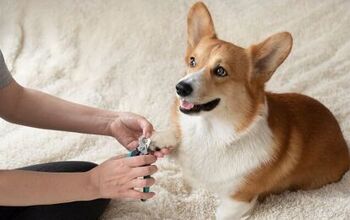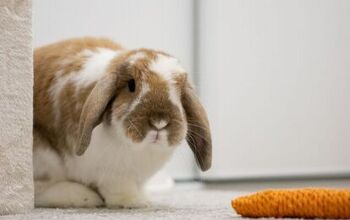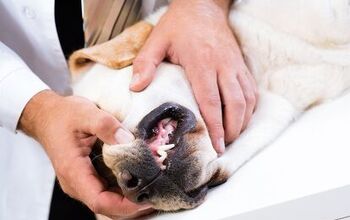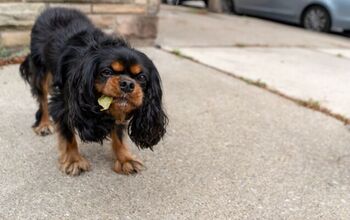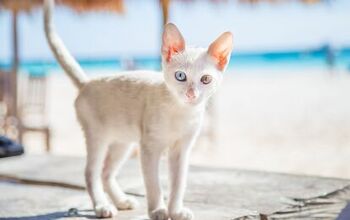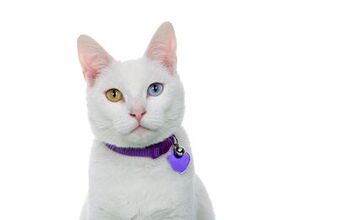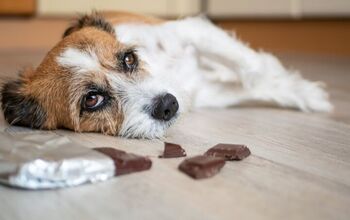What Should I Do if My Rabbit Stops Eating?

Rabbits are adorable creatures but can also be hard to care for. Why? They are delicate and sensitive creatures that are also masters of hiding when something’s wrong. Often, by the time rabbit lovers recognize there’s a problem, it has already progressed into something much more severe.
If you have recently noticed your beloved bunny isn’t munching on their usual hay or rabbit pellets or turning their nose up to their favorite treats, that’s a red flag!
In this guide, I will explore some of the most common reasons a rabbit may stop eating, including potential health risks, causes of stress, and more. Plus, I’ll share steps to help your furry friend feel better quickly.
What is a Healthy Rabbit Diet?
Rabbits are strict herbivores, meaning their diet only consists of plant-based foods. But this doesn’t mean that all vegetables and plants are a healthy option. To provide your rabbit with the best possible quality of life, you should provide them with a balanced diet, including hay or grass, leafy greens, and a small amount of commercial rabbit pellets.
Plenty of fresh hay is one of the most essential elements of a healthy rabbit diet. Like water, Timothy grass hay or oat grass hay should be available to your rabbit at all times. Remove and replace your rabbit’s hay if it has been sitting long enough that it no longer looks and smells fresh.
But what about vegetables? After all, everyone knows that rabbits love carrots. Right?
Many fruits and vegetables can be offered as a tasty treat for your rabbit, but they shouldn’t be a staple of their diet. Some safe snacks that can occasionally be offered to your rabbit include carrots, green peppers, Brussels sprouts, apples (without seeds), strawberries, bananas, and melons.
How Will I Know If My Rabbit Isn’t Eating?
Feeding a rabbit isn’t quite the same as feeding a dog. You aren’t going to fill a dish full of kibble or pellet, place it in front of them, and watch them empty the bowl. Instead, most rabbits enjoy nibbling at their hay slowly throughout the day.
With this routine, how will you know if your rabbit isn’t eating? Will it be noticeable?
Keep Track of the Food You’re Offering
Pay attention to how much food you are giving your rabbit each day. How much of the food (hay and pellets) being placed in their cage or enclosure is being eaten? How much are you removing and replacing due to it sitting untouched?
If you suspect trouble, you may want to limit the food offered, giving smaller amounts and checking or topping it up frequently throughout the day. This can make it easier to spot if anything is being consumed, allowing you to better understand the situation.
Pay Attention When Cleaning
When cleaning your rabbit’s cage, take a moment to assess how much waste you are removing. The amount of fecal matter being produced and the size/quality of this waste can provide insight into your rabbit's health.
Your rabbit’s poop should be small, brown balls that are somewhat dry due to the large amount of hay. Any change in that texture is a sign of trouble, including sticky, rock-hard, watery, soft, or smaller waste. If your rabbit has stopped eating, it will eventually stop going to the bathroom entirely.
Other Warning Signs
The loss of nutrition that occurs when a rabbit stops eating can lead to other changes. These warning signs include weight loss, teeth grinding, or decreased activity.
How Long Can Rabbits Go Without Eating?
Rabbits have very elaborate and complex digestive systems that need consistent and regular food to avoid uncomfortable, painful, or even life-threatening illnesses. While some rabbits can, in extreme situations, go without food for a couple of days, the risk of illness increases drastically after just 12 hours.
Considering this timeframe, you should contact your veterinarian immediately if your rabbit hasn’t eaten anything in more than eight hours.
Why Do Rabbits Stop Eating?
The first step to addressing the problem is identifying why your rabbit isn’t eating. This is important as if it is due to an underlying illness or problem, the root cause will need to be resolved before the rabbit's appetite will return.
Here are some of the more common explanations:
Stomach Ulcers
Rabbits are prone to developing stomach ulcers, often triggered by stress and anxiety. While an ulcer isn’t life-threatening, they are incredibly painful. This pain, combined with the nausea that it triggers, can lead to a reduced appetite.
Gut Stasis
Gut stasis (also known as ileus) is a common ailment in rabbits. It is a condition in which the digestive system slows down or stops altogether. While this may not sound like an emergency, it can quickly spiral, turning fatal, if it isn’t addressed.
The worst part about gut stasis is that the symptoms are not always obvious. In addition to a loss of appetite, the common warning signs include:
- Bloating
- Diarrhea
- Teeth grinding
- Abdominal pain
- Reluctance to be touched in the abdominal area
- Low body temperature
- Hunched body position
- Lethargy or abnormally low activity levels
Urinary Infections
Infections in the urinary tract or bladder can be incredibly painful in any mammal, rabbits included. This pain often leads to a reduced appetite or turning their nose up at food entirely. In addition to a loss of appetite, watch for difficulty urinating (straining), dribbling urine, excessive licking of the genital area, or irritation/urine scalding on the skin around the genital region.
Respiratory Infections
Another condition rabbits are prone to suffering is respiratory infections. You may not think to connect a respiratory infection to appetite changes. After all, they are two different systems in the body, right?
Respiratory infections can be incredibly uncomfortable like the other medical issues on this list. When rabbits aren’t feeling well, they often stop or reduce their eating considerably.
Dental Problems
Overgrown teeth, broken teeth, spurs, or dental abscesses are all painful conditions that rabbits are highly susceptible to. While rabbits, as prey animals, will go out of their way to hide their pain, it often impacts their appetites.
Some dental conditions will be visible if you take the time to examine your rabbit’s mouth. For example, overgrown or broken teeth are often easy to spot. Other dental problems, like abscesses, can occur in the gums, where they can’t be seen without the help of your veterinarian.
Like in humans, dental problems in rabbits left unaddressed can escalate into severe medical problems.
Non-Illness Reasons for a Rabbit Not Eating
Stress is one of the most common explanations unrelated to a physical illness. Rabbits are very sensitive pets and can experience extreme stress over the most minor changes in their routine.
Take a moment to reassess your rabbit’s living conditions and any potential triggers. Ask yourself the following questions:
- Have there been any changes to the family unit? Has a new family member (human or pet) joined the family? Has there been a loss in the family? Has someone moved away?
- Have there been any changes to your rabbit's environment? Did you move? Did you change their enclosure or introduce any new elements to it?
- Are there any loud noises? Did you recently host a party (even a children’s birthday party)? Are there loud renovations happening in the home?
- Have there recently been any significant changes to your schedule/routine?
Another common non-medical explanation for a loss of appetite in rabbits is a change to their diet. If you have recently switched your rabbit to a new food, it may upset their system. Dietary changes should be transitioned gradually to avoid this type of sudden upset.
What Do I Do if My Rabbit Stops Eating?
If your rabbit has stopped eating, or you suspect any of the health conditions mentioned above, you should contact your veterinarian immediately. Rabbits are true masters of hiding when they are sick or in pain. Any condition that has progressed to the point that they aren’t eating, or you spot any other noticeable signs, is serious and needs to be addressed as soon as possible.
How Do I Get My Rabbit to Eat Again?
After your veterinarian has run tests and determined the cause of your weight loss, it will be time to help nurse your furry friend back to health. Your vet may prescribe medication or recommend they stay for careful monitoring and treatment until their condition improves.
Carefully follow all recommendations from your veterinarian, especially those related to any medication they send home with you.
Some home remedies are available to encourage your rabbit to eat. However, you should always discuss these options with your veterinarian. You want to ensure that any steps you take support the medical treatment they have prescribed and do not hinder its effectiveness.
If your rabbit is only eating small amounts, consider offering leafy greens with higher water content to ensure they stay hydrated. It may be recommended to skip feeding rabbit pellets for a while, offering only hay and leafy greens.
You may be able to encourage them to eat by offering vegetable baby food in a syringe. Some experts also recommend belly massages to encourage the movement of the muscles in the gastrointestinal tract.
How to Prevent Appetite Loss in Rabbits
The best approach to prevent loss of appetite in your rabbit is to focus on providing them with everything necessary for a happy, healthy life. This includes:
- Feeding a diet of fresh hay and leafy greens. You can include rabbit pellets, fruits, and vegetables, but they shouldn’t be the primary focus.
- Keep your rabbit’s cage clean to prevent infections, eliminate bacteria, and reduce the risk of disease. This is also the perfect time to take note of their bathroom habits and whether there is any cause for concern.
- Make dental care a routine. This includes checking their teeth at home and providing safe opportunities to chew. I highly recommend the Kaytee Premium Timothy Treat Hideout, which serves as a hideaway and a healthy chewing solution.
- Reduce stress. Keep your rabbit in a quieter location of the home, away from heavy traffic areas or loud noises. If you know there is a situation approaching that could trigger stress, like noisy renovations in the home, take steps to keep their environment as comfortable and stress-free as possible.
Final Thoughts: What to Do if Your Rabbit Stops Eating
If you suspect your rabbit has stopped eating, consider it an emergency. Don’t hesitate to contact your veterinarian with your concerns. Early intervention is key to your rabbit’s health and well-being.
Rabbits are masters of hiding illness, pain, and discomfort. If your rabbit is suffering from loss of appetite, the underlying problem has likely been an issue for quite a while already. This often signals a serious underlying condition that requires medical help.
While there is no guaranteed way to prevent appetite loss, you can take steps to reduce the risk. Feed your rabbit a balanced diet focused primarily on hay and leafy greens. Pay attention to how much food you replace daily and the waste during clean-ups.
If you suspect trouble, act promptly. Even if your vet determines there is no emergency, it’s better to be safe than sorry!
Join the PetGuide community. Get the latest pet news and product recommendations by subscribing to our newsletter here.

Britt Kascjak is a proud pet mom, sharing her heart (and her home) with her “pack” which includes her husband John, their 2 dogs – Lucifer and Willow – and their 2 cats – Pippen and Jinx. She has been active in the animal rescue community for over 15 years, volunteering, fostering and advocating for organizations across Canada and the US. In her free time, she enjoys traveling around the country camping, hiking, and canoeing with her pets.
More by Britt








